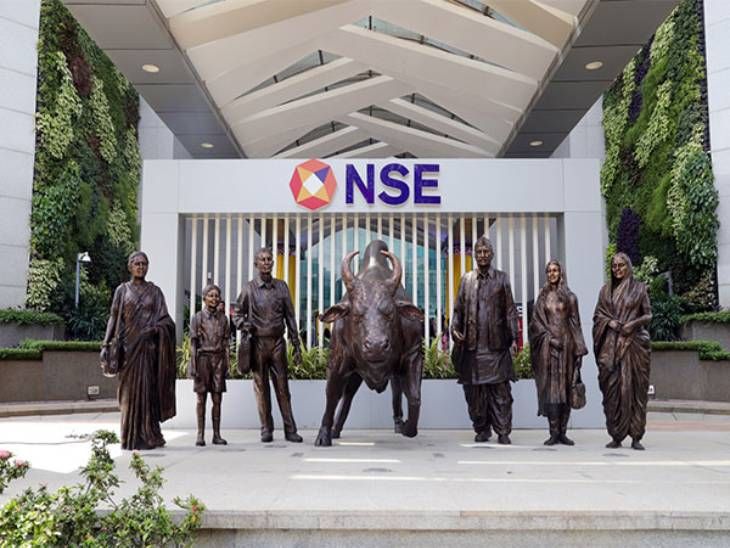Mumbai2 days ago
- Copy link

Gen Street is an American trading company that uses high-technology and quantitative trading ie Mathematical models in the stock market.
SEBI has banned the American trading firm Jane Street Group and 3 companies related to it. The American trading firm has been accused of rigging prices on the day of index expiry. SEBI has also ordered to seize illegal earnings of Rs 4,843.57 crore.
They understand this whole matter through question and answer…
Question 1: What is Jane Street Group?
answer: Jane Street is an American trading company that trading in the stock market using high-technology and mathematical models. The company used to trade extensively in Derivatives Market, especially Bank Nifty and Nifty 50 index options in India.
Last year, its revenue was $ 20.5 billion i.e. around Rs 1.75 lakh crore. Its five offers are in America, Europe and Asia. It works in more than 3,000 employees.
SEBI has banned JSI2 Investments Private Limited, Jane Street Singapore Private Limited and Jane Street Asia Trading Limited with Jen Street from the stock market.

Question 2: What have SEBI alleged on Jane Street?
answer: SEBI says that Jane Street deliberately influenced the prices of index like Bank Nifty and Nifty 50 on expiry day. The company used two main methods:
- Intra-Day Index Manipulation: In the morning, Jane Street used to buy large amounts of banks in banks futures and cash market. This used to go up the market and reduce the price of put options. At the same time, the company used to buy these cheap put options. In put options, there is a profit on the fall of the index. Later in the afternoon, it used to sell the futures of the same index on a large scale, causing the index to come down. This used to benefit in options.
- Expended Marking the Close: In the last hours of trading on the day of expiry, Jane Street impressed the closing of the index for its benefit by buying and selling large quantities. All this used to happen so fast that even the common investors did not seem to be inkling.
Question 3: How was this rigging?
answer: SEBI said that on the morning of 17 January 2024, Jane Street purchased a bank Nifty Futures and cash segment between Patch I (09:15:00 to 11:46:59 am). This accelerated the bank Nifty index and reduced the price of put options. Now Jane Street created a bearish position of Rs 32,114.96 crore in the bank Nifty options. He bought cheap put options and sold expensive call options.
Patch after noon. I (11:49 AM -15: 30: 30 PM), the company sold almost all its net positions in bank Nifty shares and futures purchased in Patch I. The sales were so aggressive that this led to a decline in bank Nifty shares and index. Jane Street suffered losses in intra-day cash and futures market trading.
But the value of put options had now increased. The Gen Street Group now earned a profit from the Bank Nifty Index Options very large positions (long puts and short calls), including the positions made during the Patch I. Jane shut down some positions and allowed the rest to expire with profits. The profit in index options was much higher than the compensation for Jane Street’s Intra-Day Cash/Futures Trading.
Jane Street made a profit of Rs 735 crore in the options, but cash and futures lost Rs 61.6 crore. Overall, that day the company earned a net profit of Rs 673.4 crore. Closing of bank Nifty was also weak due to this manipulation.

Question 4: What is cash market, future and options?
answer: In the cash market you buy or sell shares directly, like you buy goods from the shop. In this, you have to pay the entire amount immediately for the shares you buy.
Future: This is a kind of contract, in which you promise that in future, on a certain date, you will buy or sell a share or index (eg bank Nifty) at a fixed price.
This contract is valid to a certain date (expiry). In this, you do not have to pay the full amount at the time of the deal, only margin (about 10-20%).
Example:
Suppose, you buy 1 contract of bank Nifty futures, which is trading at 48,000. If the lot size is 15, then its Nural Value: 48,000 × 15 = ₹ 7,20,000.
- It does not have to pay the entire amount, only margin (about 10-20%), such as ₹ 1,00,000. If the bank Nifty reaches 49,000 by expiry, your profit will be: (49,000 – 48,000) × 15 = ₹ 15,000.
- But if the index falls to 47,000, you will suffer a loss of ₹ 15,000.
Options: This is also a derivative contract, but it gives you the right (not promised) that you can buy a share or index in a fixed price (strike price) (call option) or sell (put option). Whether you use this right or not, it is your will.
Example:
Suppose the bank is at the Nifty at 48,000, and you buy a put option with a strike price of 47,500 and the premium is ₹ 200 per lot. If the lot size is 15 then premium:
₹ 200 × 15 = ₹ 3,000.
- If the bank Nifty comes at 47,000 on expiry, your put option will be in profit: (47,500 – 47,000 – 200) × 15 = ₹ 4,500 (profit).
- But if the bank Nifty goes to 48,500, your option will be useless, and you will take a loss of just ₹ 3,000 (premium).
Question 5: How much profit did Jane Street make a total profit?
answer: According to SEBI investigation, from January 2023 to March 2025, Jane Street earned a total profit of Rs 43,290 crore from options trading.
However, during this period, the company also suffered a loss of Rs 7,208 crore in stock futures, Rs 191 crore in index futures and Rs 288 crore in cash market.
Overall, the company earned a net profit of Rs 36,502 crore, of which SEBI considered Rs 4,843.57 crore as “illegal earnings” and ordered to seize it.
SEBI has detected a total of 21 manipulative days, on the basis of which Rs 4,843.57 crore is considered illegal.
Question 6: Which rules did Jane Street violate?
answer: According to SEBI, Jane Street violated two rules:
1. Violation of FPI rules:
Under foreign portfolio investors (FPI) rules, foreign investors are not allowed to do intra-day trading (purchase and selling).
Jane Street “bypass” these rules using their Indian units, JSI Investments Private Limited and JSI2 Investments Private Limited.
These Indian units were not registered as FPIs, making Jane Street traded intra-day and ignored the rules.
2. Violation of Prohibition of Fraudulant and Unfair Trade Practices:
SEBI said that Jane Street’s trading strategy was “prima facie fraud and inappropriate”. These strategies damaged the fairness and transparency of the market. His trading had no “economic logic”, but it was only meant to manipulate the prices of the index.
Question 7: How did SEBI know this rigging?
answer: In April 2024, some media reports raised questions on Jane Street’s trading strategy. After this, SEBI asked NSE to check the trading of Jane Street.
In February 2025, the NSE also issued a warning letter to Jane Street, forbidden to do such trading, but the company ignored it.
Question 8: What action did SEBI take?
answer: SEBI issued a 105 -page interim order on 3 July 2025, in which:
- Jane Street and its subsidiaries were barred from trading in the stock market.
- Jane Street has ordered to seize illegal earnings of Rs 4,843.57 crore.
- No debit transactions from Jane Street’s accounts will be done without SEBI permission.
Question 9: What was the impact of this rigging on small investors?
answer: Jane Street’s manipulation strategy artificially up and down the prices of the index, giving the wrong indication to retail investors. For example, on 17 January 2024, Bank Nifty fell from 48,125.10 to 46,573.95, which was linked to HDFC Bank’s poor results, but Jane Street’s trading also played a role in it.
This led to wrong trading decisions for retail investors and many times. Sebi described it as “the market transparency and fairness”.
Question 10: What did Jane Street answer to these allegations?
answer: Jane Street has dismissed SEBI’s allegations and said that she follows all the rules. The company said that it would talk with SEBI and place its side. SEBI has given the company 21 days.
Question 11: How will this action affect the Indian market?
answer: Banning of large trading firms like Jane Street can affect the trading volume in the stock market. This action is like a warning for foreign investors.
Question 12: What will happen next?
answer: SEBI has asked the stock exchanges to monitor the activities of Jane Street. If Jane Street was found guilty in the investigation, more strict action may be taken. If she proves innocent, the ban may be removed and the seized amount can be returned.



